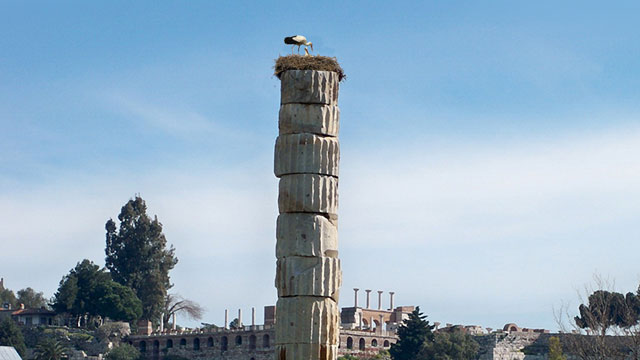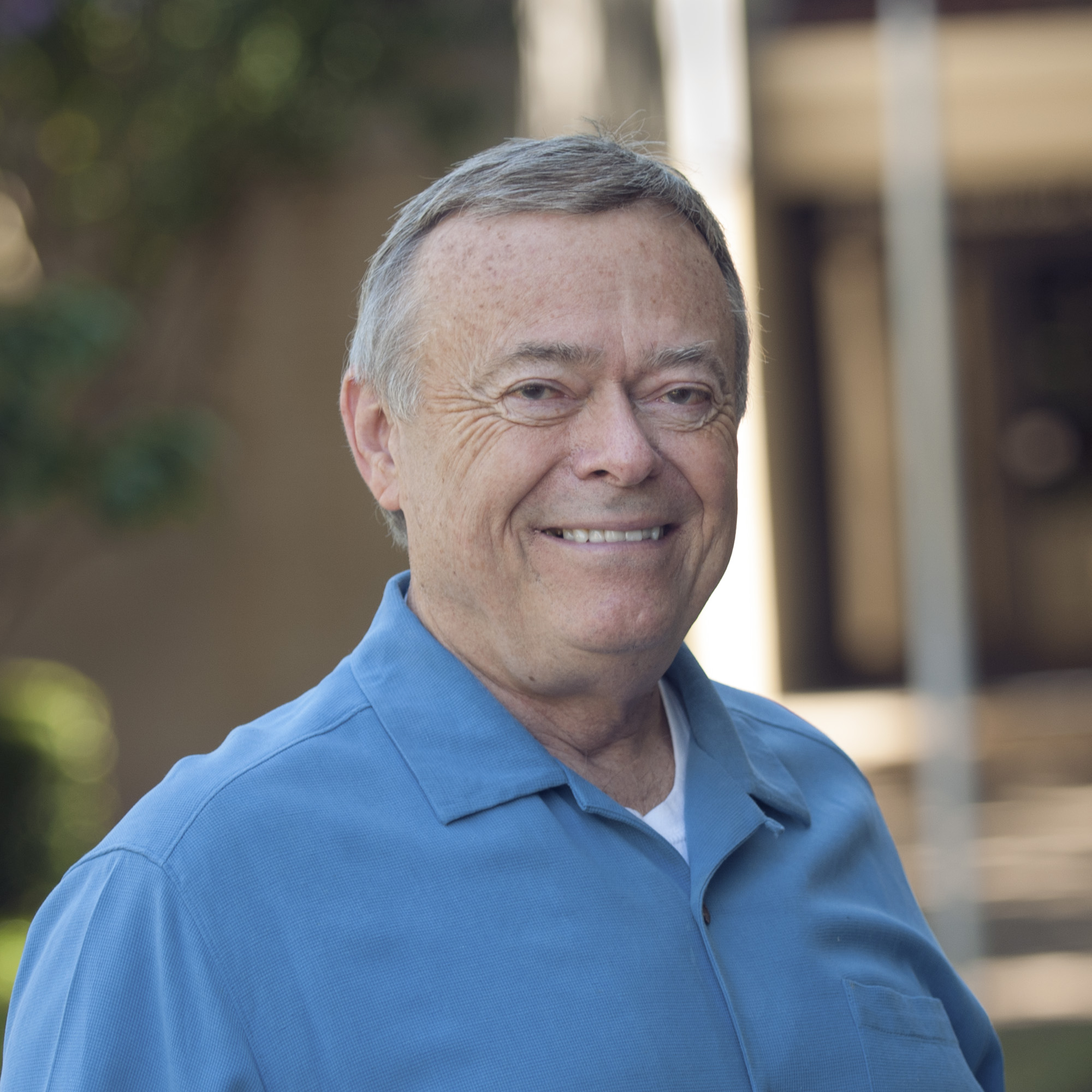And Then We Saw the Storks: God's Loyal Love and DTS

The ancient city of Ephesus is like the Disneyland of archaeological sites from the Roman world. The first thing a visitor is likely to see at this ancient magical kingdom, however, is a big disappointment, like finding a great ride in Disney’s world out of order. At one time, the Temple of Artemis (see Acts 19:21–41) was one of the Seven Wonders of the Ancient World. Today one views only a huge hole in the ground marking its ancient footprint and a lonely pillar pieced together from mismatched stone drums in 1973. It shows only something of the size and height of one of the 121 ancient magnificent columns—but little of their beauty. The solitary column rises forty-five feet (originally sixty feet)—both helpful in suggesting ancient grandeur and disappointing at the same time.
But on my last visit, just a few months ago, something happened that amazed us: a nest of storks perched atop the column, with a bird hovering above, something like the Spirit of God hovering over the waters of primordial earth, as recorded in Genesis 1:2.
In ancient times, people devoid of video games and other thumbing devices took time to observe animal behavior. Ideas such as “sly as a fox,” “wise as an owl,” “regal as a lion,” and “stupid as a donkey” were shared impressions of people in many cultures. And of all the animals that the Hebrews observed, none was believed to be as constant in care for their young as were storks.
This ancient memory explains the tie of storks to human babies even in our own time—well, at least in my time. Our grandchildren, I have discovered, are more physiologically and anatomically informed than children were when I was a boy. “Where do babies come from?” a child used to ask. In more innocent times than ours, a serviceable answer was, “The stork brings them.” Today, storks are not mentioned to—or by—kids.
Storks, hasidot! These unlikely “unclean” birds, because of observed devotion to their young, mysteriously suggested to the faith community of Israel something of the deep, lasting, covenant love of God for his people, his loyal love—his hesed.
The Hebrew word for “stork” is hasidah, a word related to hesed, the principal term describing the kindness, love, mercy, and goodness of Yahweh, the name for Israel’s covenant-keeping God. The stork was regarded as unusually kind to its young; Yahweh is indescribably kind to his people. His hesed kindness is abundant in depth (Num. 14:18), great in range (Num. 14:19), everlasting in extent (Jer. 33:11), and good in essence (Ps. 69:16).
Yahweh’s self-disclosure to Moses in Torah swept upon the prophet who was secured in the cleft of the rock on the holy mountain (Ex. 34:5–7). Yahweh proclaimed the meaning of his being in words of deity, compassion, patience—and especially of hesed we-‘emet, “grace and truth.” These are the same ideas John used to describe Jesus (Greek: charis kai aletheia) in John 1:14. John was saying, “You know what God is like. He is abundant in grace and truth. This is exactly what Jesus is like—full of grace and truth.”
This year we mark the ninetieth anniversary of the founding of Dallas Theological Seminary. It is also the fiftieth year since my first days as a student at our school. Memories of the giants who were in the land of DTS in those days rush and swirl in my mind. I recall Walvoord, Ryrie, Robinson, (S. L.) Johnson, Hodges, Unger, Campbell, Hendricks, Peters, Toussaint, and Pentecost. Each made impressions that have lasted me a lifetime.
Then there was Dr. Bruce K. Waltke and his classes in biblical Hebrew. Of all that I learned from Dr. Waltke, nothing marked me so much as his emphasis on the significance of the Hebrew word hesed as descriptive of Yahweh’s “loyal love”—as Dr. Waltke styled the term. This Hebrew word is so rich that it is variously translated as “mercy,” “goodness,” “kindness,” “love,” “grace,” “merciful goodness,” “lasting love,” “covenant love,” and the like.
Thirty-three years ago, I attended the meetings of the International Council on Biblical Inerrancy in Chicago. Dr. Waltke was giving a response to a paper on the attributes of God. When the meeting began, Dr. Waltke looked out over the audience and directed his eyes to the paper’s author.
Suddenly, he closed the folder containing his prepared notes, moved to the side of the lectern, removed and cleaned his glasses, and said, “I can’t do what I planned to do.” He had intended to respond section by section to the paper. Instead, he looked kindly on the writer, and he said he agreed with all of the blessed ideas that had been presented about the beauty and wonders of our God. “But,” Dr. Waltke said, “you missed the most important thing. You did not develop the word hesed.” He then spoke extemporaneously of hesed as the most important word in Hebrew Scripture—after the name of God—Yahweh.
A few years ago, Dr. Waltke was back on the Seminary campus during a commencement weekend marking the fiftieth anniversary of his graduation from our school. In his Commencement Chapel address, President Mark Bailey spoke of the love of God and emphasized the word hesed as the loyal love of God. Later, I greeted Dr. Waltke and commented on Dr. Bailey’s message. I said, “Our president’s words are your legacy.”
Well, they were and are more than Dr. Waltke’s legacy. An understanding of hesed—the loyal love of Yahweh—is our legacy at Dallas Theological Seminary.
In all my years on the campus, I have never seen a stork atop a column. Storks are not likely to be viewed in Dallas—outside of the zoo. Yet in all my years at DTS, I have never doubted the hovering presence of the living God—his maternal-paternal care, his loyal love—Yahweh’s hesed!
Dallas Theological Seminary celebrates its ninetieth year based on many people, many gifts, many prayers, many labors, many sacrifices, many pains, many joys.
But under all and above all and in all, the reason for ninety years of Dallas Theological Seminary is hesed—the loyal love of God.
Ronald B. Allen, ThD, DD, is senior professor of Bible Exposition at DTS, where he has taught for nineteen years.
About the Contributors

Ronald B. Allen
In addition to his teaching responsibilities at DTS, Dr. Allen preaches in churches across the country, speaks at Bible conferences, regularly leads study tours in Israel, Turkey, and Greece, and has been a biblical and theological consultant for Maranatha! Music. He has written a dozen books; was on of the senior editors for The New King James Version; Old Testament; and was the Old Testament editor for both The Nelson Study Bible (also known as The New King James Study Bible) and The Nelson’s New Illustrated Bible Commentary. Aside from his academic pursuits, Dr. Allen loves to ride his bicycle—the one that fits into his suitcase—and is licensed as both, a massage therapist and instructor.
